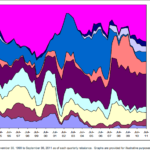Investors are starting to pay more attention to Utility Stocks and Utility ETFs of late given the low interest rate environment that doesn’t seem to have an end in sight. With the 10-year Treasury hovering around 3% and the prospect of loss of principal one bonds when rates do rise eventually, the prospect of equities with yields greater than bond yields becomes particularly appealing. Heck, even Target Date Mutual Funds behaved outrageously during the financial downturn, in many cases losing 30-40% for 2010 target dates.
In the individual large utilities space, companies like Exelon (EXC) and Dominion (D) are yielding about 5%, but they subject you to individual equity risk. The following diversified Utility Stock ETFs are all yielding a respectable 4-5%.
iShares Dow Jones US Utilities Sector Index Fund (IDU)
Utilities Select Sector SPDR (XLU)
Vanguard Utilities ETF (VPU)
Why Utility Stock ETFs?
- Yield – The yields are higher than any conventional income asset class, albeit with no guarantee of capital preservation. With money markets, CDs and government bonds paying significantly less, investors are paying attention.
- Smoothed Volatility – While the utility stock index is subject to equity risk like any other common stock, the overall volatility tends to be less than the broader market. So, in a wildly bullish upswing, you could expect the Utilities to under-perform, but in a down market, historically, they have held their own compared to the broader market. In a flat market, they outperform since the yields are close to double those of the broader market.
- Potential for Capital Appreciation – As a side benefit, as a rising tide lifts all ships, as more investor inflows occur with the Trillions of dollars of cash on the sidelines in pensions, individual investor and sovereign accounts, expect capital appreciation as well, which you don’t get in a CD or money market. And Treasury Bond Yields can’t go much lower, so don’t expect appreciation in government bonds either.
- Dividend Increases – Another benefit here is that over time, utilities tend to steadily increase their dividend payouts as earnings grow. Again, you get no increase in a bond coupon.
Utility Stock ETFs Have Out-Performed
In taking a look at the Utility ETF (XLU) vs. (SPY) as a proxy for the S&P500, here’s total share price performance over various time periods:
Timeframe  XLU   SPY
1 mo           4.5%   2%
3 mo          -1.5%   -9.8%
5 yr            -6.9%   -11%
10 yr           4%   -27%
While a negative in any column may not be much to write home about, consider that with the dividend factored in, you actually would have made money during the horrific prior 5 and 10 years periods in XLU vs. losing it in broad market ETFs like SPY.
The reason utilities have traditionally been viewed as a safe haven for risk averse investors is that while people may buy fewer iPhones or designer jeans in a downturn, they still need the lights on, even with the prospect of a US Austerity Plan perhaps akin to what Europe is seeing now. Utilities are a necessary part of the public infrastructure and there’s that government safety net underneath, ensuring that no company goes belly-up, thus impacting the public. There is no such guarantee for most publicly held companies (cynics will cite the too big to fail Financials as an exception of course, but that’s rolling the dice).
For investors seeking even higher yields than the “average” spread across the ETFs, there’s always the option of buying individual Utility Stocks which is what investors have been doing for the decades prior to the advent of ETFs and broad use of sector mutual funds. However, for the uninitiated without ample time for research and comparison, the Utility ETFs should suffice. While these utility stock ETFs are not the highest yielding ETFs like Preferreds and other esoteric sectors yielding 6-8%, they are much more steady performers less subject to shocks to the economy.
Disclosure: No position in the Utility ETFs mentioned or any Utility Stocks as of the time of this writing.











{ 0 comments… add one now }